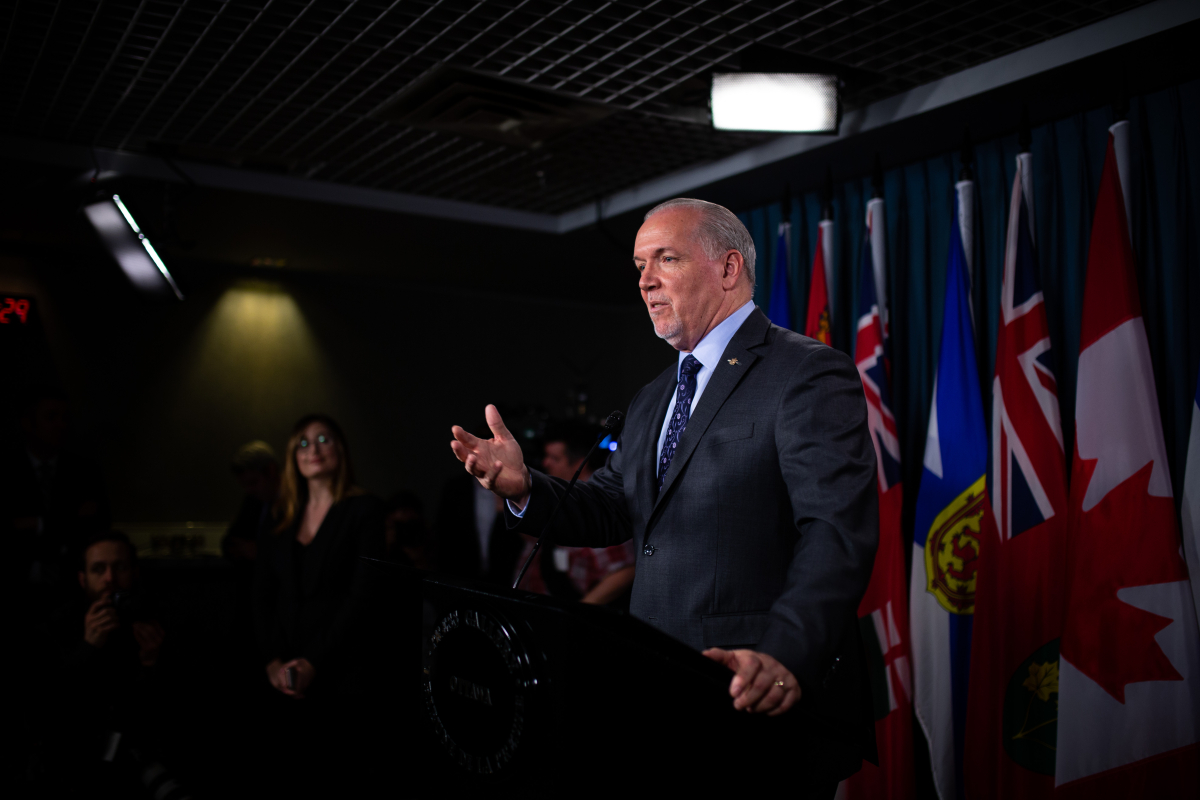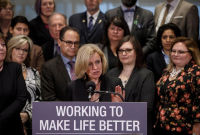Support strong Canadian climate journalism for 2025
All sides in the escalating dispute over the Trans Mountain expansion project appear to be digging in with the Alberta and British Columbia governments clashing over fuel prices and Indigenous and political leaders warning of civil unrest
Tensions escalated Monday with B.C. Attorney General David Eby threatening to sue Alberta over legislation it introduced to restrict the flow of oil, gasoline and natural gas leaving that province, which could boost fuel prices in B.C.
"The immediate recourse that's available to us is to potentially sue the Alberta government for an unconstitutional piece of legislation," he said.
Eby said he can't predict gasoline prices — now at about $1.50 per litre in Metro Vancouver — but "what I can say is any concern British Columbians have that a bill that preferentially punishes B.C. from the Alberta perspective and tries to drive up gas prices would be unconstitutional and we would take action immediately to address that."
Alberta Premier Rachel Notley said the legislation sends the message that Alberta is prepared to defend its resources.
It would direct pipeline companies, truckers and rail operators on how much oil product they ship and when. Violators would face fines of up to $1 million a day for individuals and $10 million a day for corporations.
The legislation is the latest manoeuvre in the ongoing dispute over the pipeline project that has the federal and Alberta governments supporting the pipeline expansion project, while B.C. opposes it, saying it is defending its coast from a potentially catastrophic spill.
The federal government approved the 1,700-kilometre pipeline expansion project starting near Edmonton and ending in Burnaby, B.C., in November 2016, saying the pipeline is in the national interest. Alberta said the $7.4-billion pipeline to the West Coast gives the province access to overseas markets.
But the B.C. government says the expansion and seven-fold increase in oil tanker traffic in coastal waters poses environmental and economic risks that are too great. The province is preparing to ask the courts to determine who has jurisdiction over the pipeline in the province.
Kinder Morgan announced earlier this month it is pulling back on spending for the project and gave Prime Minister Justin Trudeau's government until May 31 to give a clear signal the project will proceed.
Trudeau, Notley and B.C. Premier John Horgan met Sunday in Ottawa to discuss the pipeline, but emerged from the meeting deadlocked. Trudeau repeated the federal government's commitment to ensuring the project's completion and announced his government was preparing to hold private, financial talks with Kinder Morgan.
Indigenous leaders, who were not invited to the meeting in Ottawa, joined together with representatives of the cities of Vancouver and Burnaby on Monday to redouble their opposition to the pipeline.
Stewart Phillip, the grand chief of the Union of B.C. Indian Chiefs, said opposition is broad-based and entrenched.
"It's a stinker of an idea. It's a stinker of a proposal and it will be defeated," he said.
Phillip said resistance to Trans Mountain isn't just from Indigenous Peoples, but people of all backgrounds from across Canada.
So far, about 200 people have been arrested at protests near the pipeline terminal site in Burnaby.
Burnaby Mayor Derek Corrigan said he expected civil disobedience against the pipeline to continue to grow.
He said he's embarrassed Canada's prime minister and the Alberta premier are kowtowing to an American multinational oil company.
"I think if people totally lose faith in our democratic system, if they believe that the federal government has been able to impose its will, that they've ignored the court proceedings, then I think we're looking for chaos," said Corrigan. "And that's what worries me."
B.C.'s prosecution service announced Monday it would consider criminal contempt of court charges against protesters alleged to have broken a court injunction while demonstrating near the pipeline construction site.
The service also said it had appointed a special prosecutor in the cases of Green party Leader Elizabeth May and New Democrat MP Kennedy Stewart, both arrested at the site.
— With files from Gemma Karstens-Smith





Comments
It is an interesting contradiction with Ms. Notley claiming that on constitutional grounds Premier Horgan can not manage or restrict the flow of dilbit through the K.M pipeline in B.C. yet she can restruct the flow in Alberta. B.C. is evidently going to sue and it sounds like they may have a good case if Ms. Notley proceeds.
I sure would like to see the offers from buyers even with their names blackened out who are really interested in purchasing this bottom of the barrel tar? What is in the mixture that has a value not considered in the price?
Time to boycott Alberta and the oil whore....